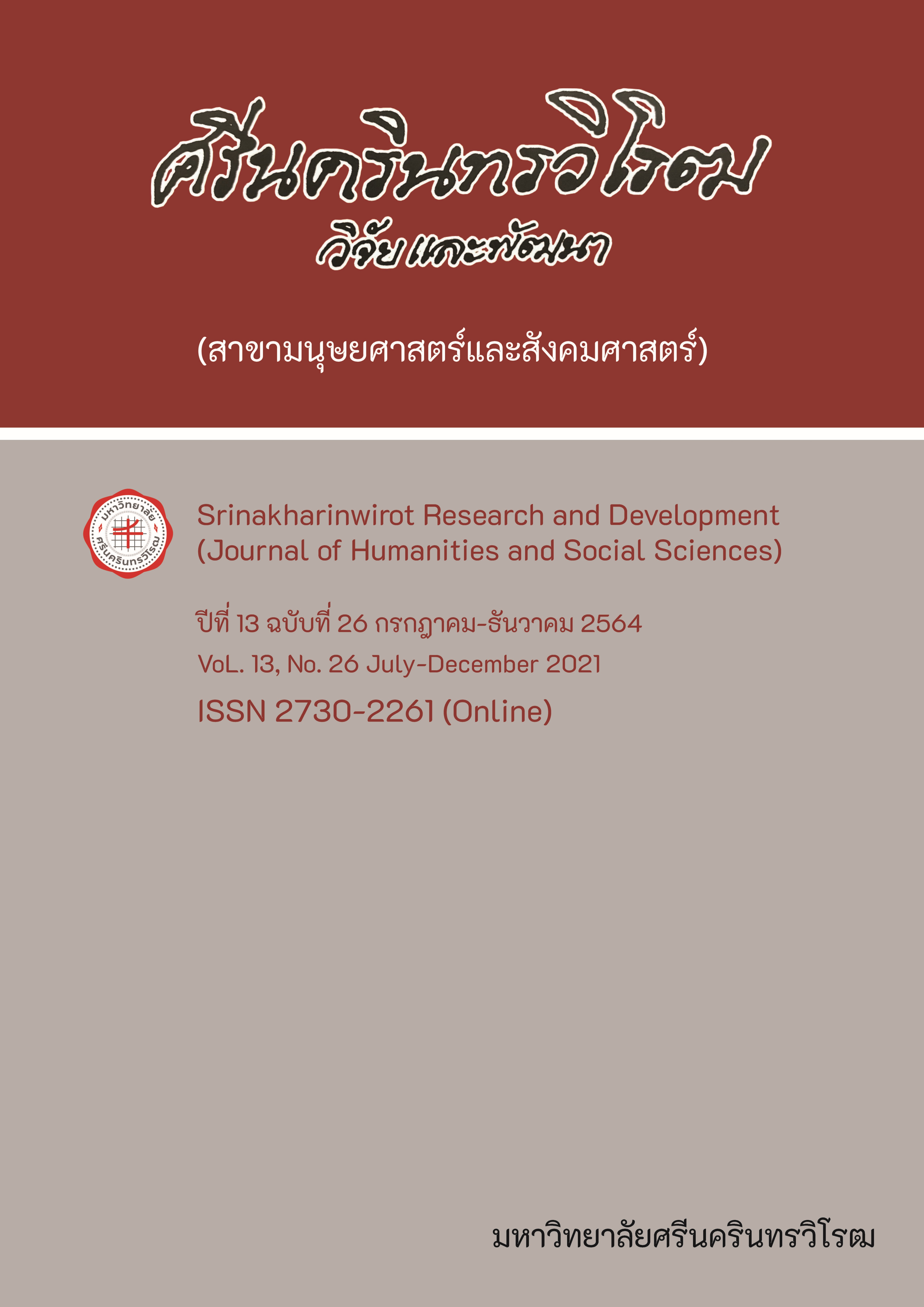THE INFLUENCE OF EMPOWERMENT ON INNOVATIVE WORK BEHAVIOR THROUGH CREATIVITY OF EMPLOYEES IN AUTOMOTIVE INDUSTRY
Keywords:
Empowerment, Innovative Work Behavior, CreativityAbstract
The purpose of this research was to study the effects of empowerment climate and psychological empowerment to innovative work behavior through creativity. The four latent variables are empowerment climate, phycological empowerment, creativity, and innovative work behavior. This research is survey research. The sample group of this research selected by purposive sampling is 210 staffs of automotive industry. This research instrument was a questionnaire of 5-level rating scales with the discrimination score between 0.58-0.70 and the overall reliability was 0.90 The data was analyzed by using Structural Equation Modeling. The study found that alternative model No. 2 could fit well with empirical data as follow 2 = 27.554, df = 19, P = 0.092, 2/df = 1.45, RMSEA = 0.046, RMR = 0.019, CFI = 0.995, GFI = 0.972 and AGFI = 0.933 Model No. 2 has effect size that the innovative work behavior was most affected by creativity, followed by psychological empowerment and empowerment climate. The total effect of them is valued 0.942, 0.541 and 0.446, respectively at 0.001 significantly statistical level. These three latent variables can explain variation of innovative work behavior as 88.7 percent However, the result of this research could be used for organizations as a guideline to improve their own workers to express innovative work behavior for reaching to innovative organization eventually.
Downloads
References
Jong, J., & Hartog, D. (2008). Innovative Work Behavior: Measurement and Validation. EIM Business and Policy Research, 1-27.
สุขุมาล เกิดนอก. (2559). อิทธิพลปัจจัยพหุระดับของวิธีปฏิบัติด้านทรัพยากรมนุษย์ต่อพฤติกรรมเชิงนวัตกรรม. วิทยานิพนธ์ปริญญาดุษฎีบัณฑิต. (การจัดการ). กรุงเทพฯ: บัณฑิตวิทยาลัย มหาวิทยาลัยเทคโนโลยีสุรนารี.
ประเวช ชุ่มเกษรกูลกิจ, และศจีมาจ ณ วิเชียร. (2561). พฤติกรรมสร้างนวัตกรรมในการทำงาน: แนวคิด ปัจจัยเชิงสาเหตุ ความท้าทาย. วารสารพฤติกรรมศาสตร์เพื่อการพัฒนา, 10(1), 25-41.
West, M. A. (2002). Sparkling Fountains or Stagnant Ponds: An Integrative Model of Creativity and Innovation Implementation in Work Groups. Applied Psychology, 51(3), 355-387.
Amabile, T. M. (1988). A Model of Creativity and Innovation in Organizations. Research in Organizational Behavior, 10, 123-167.
Gumusluoglu, L., Ilsev, A. (2009). Transformational Leadership, Creativity, and Organizational Innovation. Journal of Business Research, 62(4), 461-473.
George, J. M. (2007). Creativity in Organizations. The Academy of Management Annals, 1(1), 439-477.
Sangar, R., & Rangnekar, S. (2014). Psychological Empowerment and Role Satisfaction as Determinants of Creativity. Asia-Pacific Journal of Management Research and Innovation, 10(2), 119-127.
Zhang, X., & Bartol, K. (2010). Linking Empowering Leadership and Employee Creativity: the Influence of Psychological Empowerment, Intrinsic Motivation, and Creative Process Engagement. Academy of Management Journal, 53(1), 107-128.
Sun, L. Y., Zhang, Z., Qi, J., & Chen, Z. X. (2012). Empowerment and Creativity: A Cross-level Investigation. Leadership Quarterly, 23(1), 55-65.
Liden, R. C., & Arad, S. (1996). A Power Perspective of Empowerment and Work Groups: Implications for Human Resources Management Research. Research in Personnel and Human Resources Management, 14(3), 205-251.
Al-Madadha, A., & Koufopoulos, D. N. (2014) Linking an Integrated Approach of Empowerment to Employee Creativity. European Scientific Journal, 2, 141-146.
วัลลภ วรรณโอสถ, และวิโรจน์ เจษฎาลักษณ์. (2561). บรรยากาศการมอบอำนาจและการมอบอำนาจด้านจิตใจที่ส่งผลต่อผลการปฏิบัติงานเชิงนวัตกรรมผ่านความผูกพันต่อองค์การด้านจิตใจของนักบัญชีบริษัทเอกชน ในเขตกรุงเทพมหานคร. Veridian E-Journal Silpakorn University, 11(2), 1090-1104.
ญาณิศา เผื่อนเพาะ, และวิโรจน์ เจษฎาลักษณ์. (2562). การรับรู้การสนับสนุนจากองค์การและประสิทธิภาพในการแก้ปัญหาของพนักงาน : บทบาทการเป็นตัวแปรแทรกของบรรยากาศการมอบอำนาจและการมอบอำนาจด้านจิตใจของพนักงานในนิคมอุตสาหกรรมบ้านหว้า (ไฮเทค) จังหวัดพระนครศรีอยุธยา. Veridian E-Journal Silpakorn University, 12(5), 283-303.
Ritter, B. A., Venkatraman, S., & Schlauch, C. (2014). A Multi-level Exploration of Empowerment Mediators. Leadership & Organization Development Journal, 35(7), 649-667.
Hosseiny, A.S., Godarzi, M.A., & Poorkhalil, M. (2015). The Role of Psychological Empowerment Factors in Enhancing the Creativity of Staff of Baqiatallah Medical Sciences University, Iran. Journal of Educational and Management Studies, 5(1), 10-14.
สำนักงานคณะกรรมการนโยบายเขตพัฒนาพิเศษภาคตะวันออก. (2562). อุตสาหกรรมยานยนต์สมัยใหม่ สืบค้นเมื่อ 5 สิงหาคม 2562, จาก ttps://www.eeco.or.th/th/filedownload/1225/file-อุตสาหกรรมยานยนต์สมัยใหม่
Hair, J. F., Jr., Black, W. C., Babin, B. J., & Anderson, R. E. (2010). Multivariate Data Analysis. 7ed. Upper Saddle River, New Jersey: Prentice Hall.
ภัทรา นิคมานนท์. (2540). การประเมินผลการเรียน. พิมพ์ครั้งที่ 2. กรุงเทพฯ: ทิพยวิสุทธิ์การพิมพ์.
Nunnally, J. (1978). Psychometric Theory. New York: McGraw Hill.
มาเรียม นิลพันธุ์. (2551). วิธีวิจัยทางพฤติกรรมศาสตร์และสังคมศาสตร์. พิมพ์ครั้งที่ 3. นครปฐม: มหาวิทยาลัยศิลปากร.
Ergeneli, A., Arı, G. S., & Metin, S. (2007). Psychological empowerment and its relationship to trust in immediate managers. Journal of Business Research, 60(1), 41-49.
Nauman, S., Mansur Khan, A., & Ehsan, N. (2010). Patterns of Empowerment and Leadership Style in Project Environment. International Journal of Project Management, 28(7), 638-649.
Randolph, W. A. (1995). Navigating the Journey to Empowerment. Organizational Dynamics, 23(4), 19-32.
Scott, E.S., Silver, S.R., & Randolph, W.A., (2004). Taking Empowerment to the Next Level: A Multiple-level Model of Empowerment, Performance, and Satisfaction. Academy of Management Journal, 47(3), 332-349.
Spreitzer, G. M. (1995). Psychological Empowerment in the Workplace: Dimensions, Measurement, and Validation. Academy of Management Journal, 38(5), 1442-1465.
Conger, J. A., & Kanungo, R. N. (1988). The Empowerment Process: Integrating Theory and Practice. The Academy of Management Review, 13(3), 471-482.
Guilford, J. P. (1980). Cognitive Styles: What Are They? Educational and Psychological Measurement, 40(3), 715-735.
Sangar, R., & Rangnekar, S. (2014). Psychological Empowerment and Role Satisfaction as Determinants of Creativity. Asia-Pacific Journal of Management Research and Innovation, 10(2), 119-127.
Thomas, K. W., & Velthouse, B. A. (1990). Cognitive Elements of Empowerment: An "Interpretive" Model of Intrinsic Task Motivation. The Academy of Management Review, 15(4), 666-681.
Conger, J. A., & Kanungo, R. N. (1988). The Empowerment Process: Integrating Theory and Practice. The Academy of Management Review, 13(3), 471-482.
พิชญาพร พีรพันธุ์, และวิโรจน์ เจษฎาลักษณ์. (2562). อิทธิพลของบรรยากาศการมอบอำนาจในการทำงานและการรับรู้ความมีอำนาจในการทำงานที่มีผลต่อผลการปฏิบัติงานเชิงนวัตกรรมของอาจารย์มหาวิทยาลัยราชภัฏอุตรดิตถ์. Veridian E-Journal Silpakorn University, 12(5), 778-797.
Techsauce Team. (2564). 20 บริษัทที่คนไทยอยากร่วมงานด้วยมากที่สุดในปี 2020. สืบค้นเมื่อ 5 กุมภาพันธ์ 2564, จาก https://techsauce.co/tech-and-biz/20-top-company-of-2020
it24hrs. (2557). พาชมสำนักงาน Google ประเทศไทยกับวัฒนธรรมองค์กรที่มีเอกลักษณ์ของ Google. สืบค้นเมื่อ 5 กุมภาพันธ์ 2564, จาก https://www.it24hrs.com/2014/google-thailand-office
Downloads
Published
How to Cite
Issue
Section
License
Srinakharinwirot Research and Development Journal of Humanities and Social Sciences is licensed Under a Creative Commons Attribution-NonCommercial-NoDerivs 4.0 International (CC-BY-NC-ND 4.0) License, Unless Otherwise Stated. Please Read Journal Policies Page for More Information on Open Access, Copyright and Permissions.



